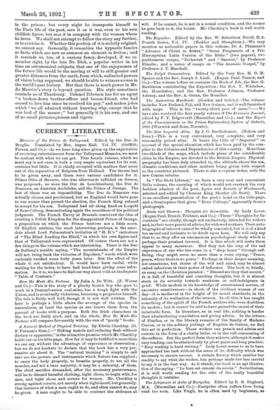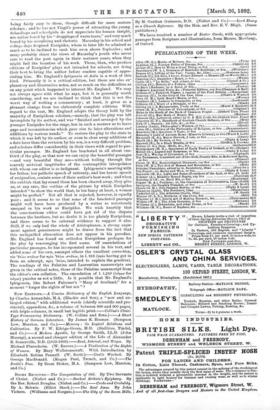being fairly easy to them, though difficult for more mature
scholars ; and he has not Virgil's power of attracting the young. Schoolboys and schoolgirls do not appreciate his human insight, are rather bored by his "droppings of warm tears," and very much bored by his moralising and rhetoric. Macaulay in his school and college days despised Euripides, whom in later life he admired so much as to be inclined to rank him even above Sophocles ; and many probably share the views of Macaulay's youth who never care to read the poet again in their maturer years, when they might feel the beauties of his work. Those, then, who produce editions of Euripides' plays not intended for schools, are doing their best to bring the author before readers capable of appre- ciating him. Mr. England's /phigeneia at Aulis is a work of this kind. Primarily it is a critical edition, but there are also ex- planatory and illustrative notes, not so much on the difficulties as on any point which happened to interest Mr. England. We may not always agree with what he says, but it is generally worth considering, and we are inclined to think that this is not the worst way of writing a commentary ; at least, it gives us a pleasant change from too elaborately complete editions. With regard to the text, Mr. England adopts the theory held by the majority of Euripidean scholars,—namely, that the play was left incomplete by its author, and was "finished and arranged by the younger Euripides for the stage, but in such a manner as to leave gaps and inconsistencies which gave rise to later alterations and additions by various bands." To restore the play to the state in which it was left by its author, or even to clear away additions of a date later than the revision by his son, is a very difficult problem, and scholars differ considerably in their views with regard to par- ticular passages. 31r. England has bracketed in all about one- third of the play, so that now we can enjoy the beautiful passages —and very beautiful they are—without toiling through the scarcely metrical ineptitudes of the contemptible interpolator with whom our editor is so indignant. IphigeneLs's meeting with her father, her pathetic speech of entreaty, and her heroic speech of resignation, contain some of their author's best work ; and when the rubbish that lay round them has been cleared away, they give us, at any rate, the outline of the picture by which Euripides intended "to show the world that, in his fancy at least, a woman might be perfect." Not all that is rejected, however, is equally poor ; and it seems to us that some of the bracketed passages might well have been produced by a writer so notoriously unequal in his work as Euripides. We wish heartily that the conscientious editor could have got rid of the dispute between the brothers, but no doubt it is too plainly Euripidean, and there seems to be external evidence to support it also. Still, if we only had the whole of Aristophanes. a strong argu- ment against genuineness might be drawn from the fact that this undignified altercation does not appear in his parodies. Mr. England has found an orthodox Euripidean prologue for
the play by rearranging the first scene. Of emendations of particular passages, he has incorporated several in his text, and added some of his own, amongst others the excellent correction,
TZtv '11tiou ar6Xor for wpbs 'Woo crgt5Xog, in 1. 816 (rpbs having got in from an adscript, 71-1,4 'Ildov, intended to explain the genitive).
The readings of the Palatine and Laurentian manuscripts are
given in the critical notes, those of the Palatine manuscript from the editor's own collation. The emendation of 1. 1,249 ()arse for
hore) puzzles us not a little. Is it possible that Mr. England's Iphigeneia, like Robert Falconer's "Mary of Scotland," for a moment "forgot the rights of her sex " ?



































 Previous page
Previous page